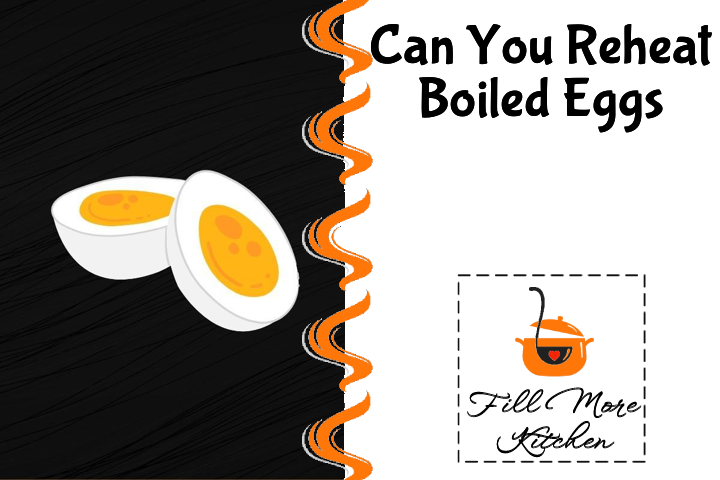Hard-boiled eggs are a convenient and portable option for meals or snacks, as they can be prepared in advance and stored in the refrigerator for several days. However, the question arises whether it is possible to reheat them after refrigeration and if yes, then what is the appropriate method?
If you want to reheat boiled eggs, you can do so by immersing them in hot water, with or without the shell, but it’s crucial to avoid overcooking them. It’s not recommended to use a microwave for reheating eggs in their shells, regardless of whether they are raw or boiled.
Chilled hard-boiled eggs are a tasty treat that can be consumed as is, seasoned with salt and pepper, or added to a salad after peeling and chopping.
If you plan to make a recipe that requires boiled eggs, like egg salad, potato salad, or deviled eggs, it can be convenient to cook them ahead of time and refrigerate them until ready to use.
However, there may be instances when you desire a warm egg, particularly during breakfast, hence it is understandable that you would want to learn how to reheat a hard-boiled egg.
However, if you have prepared soft-boiled eggs in advance, they cannot be consumed cold, and therefore, it is necessary to reheat them before eating.
Don’t worry, you can easily reheat both hard-boiled and soft-boiled eggs.
How to Reheat Boiled Eggs
Boiled eggs are fully cooked after being exposed to a temperature of 212°F (100°C) for a considerable amount of time, and therefore, when reheating them, it is crucial to avoid overcooking.
If you want to reheat a hard-boiled egg, the most effective method is to submerge the egg, still in its shell, in boiling water until it is completely covered. Cover the pan with a lid and let it sit for approximately 10-15 minutes. The egg will be thoroughly heated and can be consumed.
By using this technique, you can efficiently warm up the boiled eggs without the risk of overcooking, which can result in a greenish hue on the yolk and a tough texture on the egg white.
For soft-boiled eggs, the procedure is comparable, but you should begin by pouring hot water into the pan, and then add the soft-boiled eggs. Allow them to sit for only 4 to 6 minutes.
Soft-boiled eggs are usually consumed in the shell and are most enjoyable when the yolk is still liquid. A popular way to eat soft-boiled eggs is dipping âsoldiersâ (toast strips) into the yolk. If you overcook the egg, it will make the yolk hard, thus ruining the experience.
It is safe to reheat an egg without compromising its quality or nutritional value.No adverse effects will occur.
Can You Reheat Eggs With and Without Shell?
If you have already peeled the hard-boiled eggs and want to serve them hot, you may wonder if it is possible to reheat them.
Reheating hard-boiled eggs is possible with or without the shell. In case the eggs are already peeled, simply immerse them in hot water, cover and wait for 3-4 minutes. If they are not warm enough yet, leave them for a few more minutes.
Boiled eggs that are without a shell require less time to heat up compared to those with the shell.
It is possible to warm a peeled egg in the microwave. Set the timer for around 10 seconds, and set the power at 50%. Check to see if it’s hot enough and add time as needed.
To ensure even heating of boiled eggs when reheating them in the microwave, it is recommended to cut them in half and cover with a microwave-safe lid to prevent spattering.
Will an Egg Explode in the Microwave?
It is a well-known fact that putting eggs in the microwave can cause them to explode, despite it sounding like a myth.
Whether raw or boiled, eggs in the shell will burst in the microwave, causing the shell to crack and the egg to scatter all over the interior of the microwave; while boiled eggs may create a smaller mess than raw ones, they are still likely to explode.
Eggs can burst in the microwave due to the steam that is produced during cooking, which accumulates against the inner shell surface and creates pressure, leading to outward popping or explosion of the shell.
The reason for this phenomenon is identical to why you puncture the skin of a potato with a fork or make an incision in a frozen meal before microwaving it.
When reheating a boiled egg, the eggshell may experience pressure due to the remaining liquid inside that turns into steam.
However, it is feasible to microwave a whole egg in its shell by following the correct method to prevent any untidy blunders.
Good Housekeeping suggests the following steps:
Put your boiled egg in a microwave-safe bowl and cover it with a damp paper towel. Heat it for 10 to 20 seconds, then check to see if it’s warm enough.
1. Place a big bowl filled with water in the microwave and heat it for 3 minutes.
2. Make a small puncture in the bottom of the egg with a safety pin or needle. This will provide an outlet for the steam and stop the egg from bursting. (As some cooks suggest, you can also add salt instead of making a hole.)
Put the boiled egg in a bowl and heat it in the microwave for four minutes at half power (press 5).
Adjust the cooking time to your preference for yolk doneness.
A reminder about puncturing the eggs: The American Egg Board warns that if you use an unsanitized needle to pierce the shell of an egg, it can introduce dangerous bacteria into the egg that will remain even after they are cooked.
If you want to sterilize a needle, it is necessary to boil it in water for approximately 30 minutes, whereas boiling an egg until it is well done takes around 12 minutes, so you can calculate the difference.
Do Boiled Eggs Last Longer Peeled or Unpeeled?
Considering that boiled eggs heat up more quickly when peeled, you may contemplate removing the shells before refrigerating them. However, the question remains whether peeled boiled eggs can remain fresh for as long as those still enclosed in their shells.
If you have boiled eggs that are still in the shell, they can be stored in the refrigerator for a longer time compared to unpeeled ones, but if you have already peeled them, there are methods to keep them fresh for an extended period.
An unpeeled boiled egg can remain fresh in the refrigerator for up to a week. Use your senses to determine if they are still good. If they have a strong odor, it’s best not to take the chance.
Peeled eggs have a limited shelf life of 2-3 days, but there are some methods to prolong their freshness.
For reheating boiled eggs, it is recommended to store them in an airtight container like a Ziploc bag or sealable plastic container, which also helps in preventing the egg odor from overpowering your refrigerator.
You can store peeled eggs by putting them in a bowl and filling it with cold water. Make sure to leave the bowl uncovered in your refrigerator, and switch out the liquid every day.
It is important to refrigerate eggs within an hour of cooking and avoid taking them out of the fridge for more than two hours before consumption or use.
If you need to move boiled eggs, for instance, to a picnic or potluck, place them in a plastic container that has been covered with ice cubes.
It is possible to freeze boiled eggs, but only the yolks. The boiled whites don’t respond well to freezing and are likely to become tough or runny.
The yolks hold up nicely in the freezer, and can remain frozen for a period of up to 6 months. Defrost them and use them for salads.
You can also check this video about “Can You Reheat Boiled Eggs?”
Check out our top 10 reviews!
Related posts
https://fillmorekitchen.com/are-slow-cooker-dishes-ovenproof/
https://fillmorekitchen.com/is-sous-vide-cooking-safe/
https://fillmorekitchen.com/kitchenaid-stand-mixer-vs-bread-machine-which-one-should-i-buy/
https://fillmorekitchen.com/can-you-eat-a-cut-avocado-left-out-overnight/
https://fillmorekitchen.com/how-to-tell-if-something-is-dishwasher-safe/



